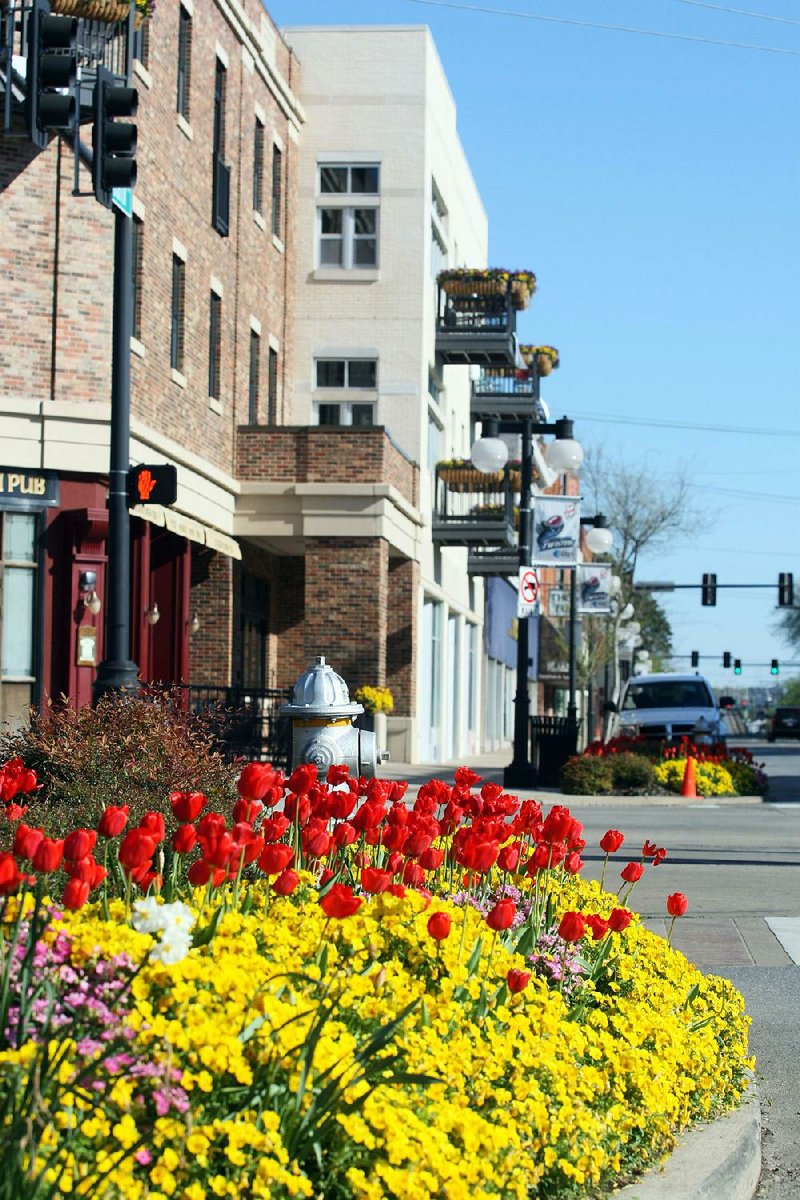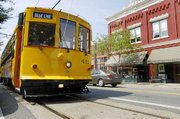On a warm Tuesday in late February, Frank Webber shows a visitor through the North American headquarters of Orbea, a high-end bicycle manufacturer based in Spain.
We're near the banks of the Arkansas River at 700 W. Broadway St. in North Little Rock, but this facility and those who work here give it the feel of somewhere other than Arkansas. Many of the employees ride their bikes to work. Those bikes are parked neatly inside the building with riding gear hanging on the wall. In the break room, there's a Diamond Bear beer tap for those who come back following their afternoon rides.
The sales and warehouse operation covers almost 20,000 square feet in what's known as The Works at Rockwater. Bikes and parts are shipped from here to almost 130 Orbea dealers across the country.
"One of the advantages of coming here is the fact that this is right on the Arkansas River Trail," says Webber, Orbea's operations manager. "The bikes are built in Spain, but we have from 2,000 to 4,000 stored here at any one time, depending on what time of year it is. With all that's being done across the state, Arkansas will soon be among the top places in the country for cycling. We like being a part of that."
On one end of the building, lawyers Jim Jackson and Lisa Ferrell work in their offices, planning the adjacent Rockwater Village development. Since the Great Recession ended, the sale of lots in the area has taken off. The first phase of single-family home development is known as the Residences at Rockwater. Only six of the original 33 lots remain.
"Seventy percent of the families who bought at the Residences moved here from places outside of North Little Rock," Ferrell says. "Homes in that phase start at $475,000 and include several that are worth more than $1 million."
The second single-family home phase is known as the Porches. Nine of those 15 lots have been sold with seven of the nine families moving from outside North Little Rock. Homes in the Porches start at $265,000. The third phase of development will have 25 to 30 homes in the $325,000 to $375,000 price range. There also are plans for multifamily and commercial projects that will surround a nearby traffic circle. The Rockwater Marina and an apartment complex were among the first things to open in the neighborhood.
"In planning Rockwater, we used traditional neighborhood design similar to Harbor Town in Memphis, Seaside in Florida and several others around the country," Ferrell says. "We've purchased a lot of property in the area--about 50 acres. Others have also started purchasing property to join in all of the good stuff happening here. Every home we build has a front porch, and neighbors use them for visiting and enjoying one another's company. This lifestyle has attracted a diverse group--singles, families with kids, empty nesters, young, old and everything in between. Though the marina is open to everyone, it serves as a community gathering place for those who live in Rockwater."
Rockwater is the only designated Southern Living Inspired Community in the state. Ferrell says the designation was received "after a careful review of our architectural standards, a site visit, and a long vetting process."
Decades ago when residents of Little Rock referred to North Little Rock as Dogtown, it was a derisive term. Those Little Rock residents would cross the Arkansas River and dump dogs they didn't want. North Little Rock civic leaders once were so sensitive that they held a mock funeral and erected a gravestone on Main Street reading: "Here lies Dogtown, born of apathy, killed by civic pride, gone forever."
These days, the millennials living in downtown North Little Rock use Dogtown as a term of endearment. Dare we say it? North Little Rock is suddenly hip.
At his office inside the classic City Hall on the corner of Broadway and Main, Mayor Joe Smith loves talking about the new North Little Rock. Smith, who has been a North Little Rock resident most of his life, was elected mayor in 2012 after working for more than two decades in city government in positions such as director of commerce and government affairs, director of administration and director of community relations. He's the fourth generation of his family to call North Little Rock home.
Serving under longtime Mayor Patrick Henry Hays, Smith was the city's point person when the Arkansas Travelers decided to leave Little Rock's Ray Winder Field and move to the new Dickey-Stephens Park in North Little Rock. As mayor, Smith has continued to focus on downtown development.
Smith was raised in the city's Baring Cross neighborhood. His father was a police officer. Like so many North Little Rock residents through the decades in what traditionally was a blue-collar town, Smith's grandfather and uncle worked for the Missouri Pacific (now Union Pacific) Railroad. His great-grandfather owned a restaurant and boarding house on Pike Avenue.
"My biggest challenge for 20 years has been finding ways to reinvent downtown," Smith says. "It takes patience. It's not the type of thing that happens overnight. We were able to land what's now Verizon Arena and Dickey-Stephens Park, but other parts of the puzzle took longer than we thought they would. Our entertainment district has now become quite attractive, more people are living downtown, and we've got high-tech jobs on the way."
Verizon Arena opened in October 1999. Dickey-Stephens Park opened in April 2007.
When development in the areas surrounding those two venues didn't take off as quickly as some had hoped, Smith determined that North Little Rock needed a downtown plaza that could serve as a gathering place before and after events. He took delegations to Knoxville, Fort Worth, New York and Kansas City to visit various plazas. He kept coming back to the Sundance Square Plaza in Fort Worth, which features fountains and murals. Smith decided that it would be the model for what North Little Rock would build.
Last month, online voters agreed to call the North Little Rock version the Argenta Plaza. Construction on the $4 million project on city property along Main Street between Fifth and Sixth streets will begin later this spring. North Little Rock was called Argenta from 1906-17, and its downtown is commonly referred to these days as Argenta.
In November, First Orion announced that it will build its headquarters facing the plaza and bring almost 200 employees to downtown North Little Rock. The chief executive officer of First Orion, which provides call blocking and call management technology for mobile phones, is Charles Morgan. He is the founder of Acxiom Corp., the data-gathering company that employs hundreds of people at Conway. As the Acxiom CEO from 1972-2008, Morgan grew what had been a small company to one with $1.4 billion in annual revenues. First Orion also has offices in Dallas, Seattle and London.
"Central Arkansas is an inspiring place for us to be," Morgan says. "We're helping to transform the region into a prominent technology hub, and we're honored to be such a big part of Argenta Plaza."
The First Orion building will be six stories and have retail on the ground floor. Company offices are now in Little Rock's River Market District. Morgan hopes to complete the building in early 2019.
Smith says: "The atmosphere that we have in downtown Argenta is conducive to attracting the kind of employees who work at First Orion." He notes that employees will be able to walk to restaurants, bars, entertainment venues, concerts and sports events at Verizon Arena, baseball games at Dickey-Stephens Park (which consistently makes lists of the finest minor league ballparks in the country) and the Arkansas River Trail.
That type of accessibility has led to additional residential projects downtown. For instance, the Fort Smith-based company ERC is nearing completion of a 164-unit apartment complex on land that once housed a feed mill. The complex will be known as THRIVE. ERC has built similar developments in Bentonville and in the St. Louis suburbs. There will be one-, two- and three-bedroom units in six brick buildings with ground-floor parking garages. ERC markets the upscale apartments to software designers, marketing experts, architects and other professionals.
Another attraction for ERC is the site's proximity to Winrock International's Innovation Hub. Winrock International is a $100 million nonprofit organization with more than 1,000 employees stationed in dozens of countries. Rodney Ferguson, Winrock's president and CEO, says: "Revitalizing Argenta by lifting up budding entrepreneurs isn't so different from empowering people and new businesses across the globe. It's really all about giving people the opportunity to live a better life."
"You can't have a strong city without a strong downtown," Smith says. "I've always believed that. I talk at least once a week to people that I consider legitimate developers who are looking to do something in North Little Rock. It's going so well right now that it's kind of scary. But you only have one chance to make a first impression, so we're going to do this plaza and the surrounding buildings right. We're going to give people a reason to live downtown, and we're going to give tourists a reason to stay an extra night. There has been significant economic development around all of the plazas that we've visited across the country. Now, we're investing $4 million in the plaza here, and we're seeing about $30 million in private investment near it with more to come."
The plaza's berms and water features will be built to resemble the oxbow lakes on the east side of North Little Rock. There will be jetted fountains, a water wall, and a large screen that can be used for movies and sports events. When there's not a movie or event being shown, Smith wants works of art to be on the screen. A stage will have an area in front of it that can hold almost 1,000 people. The water wall, which will be lighted, is projected to be 50 feet long and 20 feet high. The mayor also wants restaurants facing the square with outdoor dining areas.
A few blocks away at Rockwater, Ferrell talks excitedly about the future.
"We're going to have multifamily complexes, single-family housing, office space and retail within walking distance of each other," she says when talking about downtown North Little Rock and its riverfront. "Down at the marina, we now have a company called Rocktown River Outfitters that's offering kayak tours on the river. And business is great. We're starting to have real diversity here."
After more than 20 years of efforts to develop the area, it appears that Joe Smith's dreams are finally coming true. In the spring of 2018, Dogtown has become uptown.
Editorial on 03/11/2018

